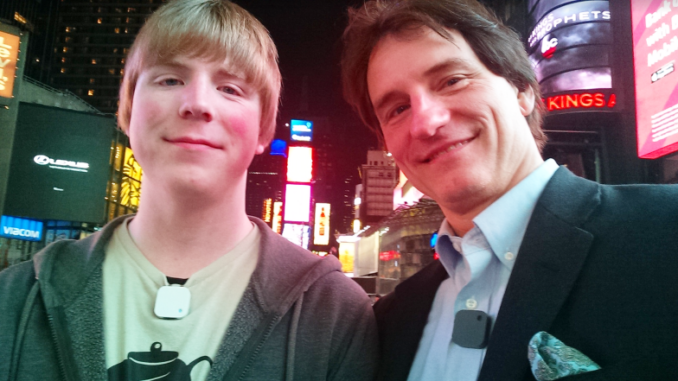
Psychology professor Mark Hatala has been using a wearable camera to document his life since May 2014. The camera he wears, and sometimes sets on a shelf or other surface, takes a photo every 30 seconds.
Hatala said the venture is part of a research movement called the “Quantified Self,” in which a person uses technology like a camera or a Fitbit to measure various aspects of their life, like how often they eat a certain food. If he wanted to, Hatala said, he could see every meal he has had in the past four years.
“It’s very redundant, but it’s interesting because you can look up any day of your life and see what was happening,” Hatala said.
Hatala said he never takes the camera into public bathrooms or private property.
“I have dated women who said, ‘You have to take that damn thing off,’” he said while laughing.
Hatala said he is one of many people who document their lives this way. He revealed he is writing a book about his experiences as well as those of other people using technology to document their lives.
“Steve Mann, a professor at the University of Toronto, has been documenting his life since the 1990s,” Hatala informed.
Hatala said there are multiple reasons for this endeavor. One of them is his own interest in cognitive psychology, particularly reminiscence and memory.
A major topic Hatala and many other psychologists are interested in is why people forget things. One major theory is people forget because they don’t have enough cues, and the camera he uses provides visual cues regularly.
Another facet of his cognitive science interests is the possibility of representing the present in the future by creating virtual realities with the photos his camera takes.
“With enough pictures of everything, you can replicate wherever you’re at,” Hatala explained. “I could replicate things like drives into my country house and walks around campus.”
Then he could recreate and relive those moments wherever he is at any time through a virtual reality constructed with photos.
Hatala is also interested in social history, which meshes well with his interest in memory and reminiscence. Hatala added that he was a history major as an undergraduate, so he has some history knowledge to draw upon for his current studies.
“What I’m creating is an example of what it was like to be a college professor at the dawn of the 21st century, and I think that has value,” Hatala said.
Hatala related this to mummies we see in museums. He said he wonders what the daily life of that once-living person was like. He also admitted he has thought about having his body frozen when he dies for the same purpose as mummification — preservation.
With enough data from his camera, Hatala hopes he could recreate himself in such a way that people could interact with him after he dies. He said the technology picks up habits, interests and physical features and could possibly create an entire identity.
“In theory, my great-grandchildren could pull me off of a shelf like a book and sit and talk to me,” Hatala remarked.
Another goal of Hatala’s undertaking is self-reflection. He said a lot of people who record their lives say their lives are more interesting than they realized.
“I think I have a lot more interaction with people than I realized, because I can see everyone I talk to each day,” Hatala said.
There are even smaller things Hatala has noticed. He noted with amusement that he has seen photos of himself laughing in which he thinks he looks utterly ridiculous, but he doesn’t worry about it much because he is not a very self-conscious person.
Hatala said even taking one photo a day can be a great tool in self-reflection. One thing this technology does is show people how they really are.
“To be able to see yourself how others see you, that’s invaluable,” Hatala emphasized. “That’s what leads to personal growth and change.”
